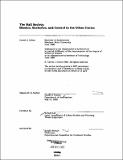The mall society : illusion, exclusion, and control in the urban center
Author(s)
Glenn, Daniel J
DownloadFull printable version (23.04Mb)
Other Contributors
Massachusetts Institute of Technology. Dept. of Architecture.
Advisor
Tunney Lee.
Terms of use
Metadata
Show full item recordAbstract
Pre-planned, centrally-managed, privatized public space is rapidly replacing the traditional downtowns of our communities and increasingly, the centers of our largest cities--in the form of the shopping mall. This thesis explores some of the powerful implications of this shift: 1) the deepening of a consumer culture; 2) a heightening of socio-economic polarity; and 3) the institutionalization of a new form of subtle, omnipresent, largely consensual control. Three key tools of mall design and private management--illusion, exclusion and control--are examined in case studies of two malls in downtown Boston: the urban mall as megastructure, Copley Place; and the "festival marketplace", Faneuil Hall Marketplace. Then, an exemplar of an illusory, exclusionary and controlled environment is presented: Disney World in Orlando, Florida. Finally, a speculative short story, The Mall Society in 2038,is presented, illustrating the potential society that could develop given the continued mallification of our socio-spatial environment.
Description
Thesis (M.S.)--Massachusetts Institute of Technology, Dept. of Architecture, 1989. Includes bibliographical references (p. 141-145).
Date issued
1989Department
Massachusetts Institute of Technology. Department of ArchitecturePublisher
Massachusetts Institute of Technology
Keywords
Architecture.